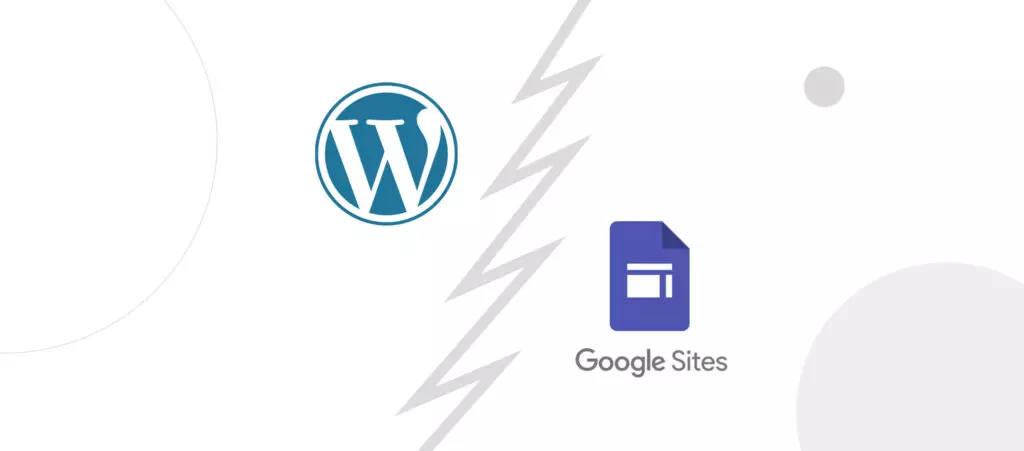- Blogs
- Industry Insights
- WordPress.com, WordPress.org or Google Sites: which is better for you?
Industry Insights / 11 min read
WordPress.com, WordPress.org or Google Sites: which is better for you?

WordPress.com, WordPress.org, and Google Sites are three platforms you may have heard about when researching website-building platforms. They can all build websites, but each has different scopes, benefits, and disadvantages.
This article will explore each of them and help you determine which one you should choose depending on your needs.
What are WordPress.com, WordPress.org, and Google Sites?
WordPress.com, WordPress.org, and Google Sites are platforms for building websites, but they each have their own features, pros, and cons you should consider before using them.
Let’s introduce each platform and what they can do for you so you can better understand which one serves your needs better.
WordPress.org

WordPress.org is a free, self-hosted, open-source CMS software released in 2003. The files you need to run WordPress (the “core” files) are free and downloadable from WordPress.org. However, you need to pay for third-party web hosting services to use these files since WordPress.org does not host websites.
There are even web hosts dedicated exclusively to WordPress websites. They install WordPress for you on their servers and often offer multiple plans with features like regular backups, backup restoration, security scans, and staging environments.
With WordPress.org, you can build any website and enjoy the following benefits:
- Picking your custom domain name instead of being limited to subdomains.
- Absolute freedom to develop your site however you see fit.
- Monetization and eCommerce support.
- Possibility to use scripts like Google Analytics.
- Full support for membership websites.
WordPress.com

WordPress.com is a “lite” version of WordPress.org released in 2005. It runs on a modified version of WordPress.org’s software that limits how much owners can modify their websites.
On the other hand, WordPress.com is a managed web hosting service, so owners don’t have to worry about seeking third-party web hosting. WordPress.com takes care of everything for them.
WordPress.com aims more at people with little to no tech skills who want to create simpler websites. It has the following features:
- Easy to set up. Just sign in and give a subdomain name for your website.
- Free to use (no need to pay a third-party web host), with 3GB of storage. There are perks to being a paid member, but WordPress.com’s free plan is perfect for essential purposes.
- WordPress.com takes care of backups, maintenance, and primary security for you.
- Simple site customization.
If you only want to blog, WordPress.com has a low barrier by keeping things simple and will be perfect for you. WordPress.org is better suited for highly customizable websites or those wanting to experiment with web development.
Google Sites

Google Sites differs from WordPress.com and WordPress.org because it’s neither a traditional CMS nor a traditional website builder (a platform for creating websites without code).
It is part of Google Workspace (formerly G Suite), a collection of web-based applications for work, productivity, and collaboration. Given the context, Google Sites is more of a tool for creating a simple website dedicated to sharing information about a specific topic.
For example, you may use Sites to create a wiki containing all the information newcomers need to know about a small company, for an online resume or portfolio, or a specific project’s work-related project. Google Sites does not allow you to create blogs, eCommerce, or membership sites.
In short, Google Sites is not for you if you want to create a blog, a complex business website, or an online store. Instead, it’s a free tool to quickly build a simple site with a drag-and-drop interface. Some benefits of Google Sites include:
- Integration with all Google Workspace apps, including Drive, Calendar, Forms, and Maps, making it great for professional collaboration in small teams.
- Ease of use.
- A small but effective variety of templates, layouts, and themes.
- Limited customization features using the drag-and-drop interface.
Pros and cons of using WordPress.org, WordPress.com, and Google Sites.
The following table summarizes the pros and cons of using each platform.
| Pros | Cons | |
WordPress.org | • Limitless freedom to develop your website. • Monetization features. • Scripts. • E-commerce and membership support. • Freedom to choose your preferred hosting provider and eventually migrate to another provider. • Capability to install dozens of thousands of themes and plugins (many are premium). | • Upfront monetary costs for hosting your website. Prices can range from $20-$30/year to hundreds per year or more, depending on your plan and whether you use premium plugins and themes. • If you have no software development experience, you’ll need help from a developer to implement complex websites such as online stores. • Set up is a bit more involved than WordPress.com’s. Luckily, some hosting services make the process very user and beginner-friendly. • You must handle website maintenance, such as updating the WordPress core installation, themes, and plugins. • Not performing timely updates can make your website vulnerable to cyberattacks. • You must handle security and backups. There are free and premium plugins for both. |
WordPress.com | • Easy to set up and use. • You don’t have to worry about maintenance. • Easy to upgrade to paid plans, starting at $4/month or $60/year. | • Your website will display ads (from which you can’t profit) unless you pay for a premium plan. • Monetizing your site requires a premium plan. • By default, you can only access subdomain names like “www.my-website.wordpress.com,” which can seem unprofessional if you’re trying to build a brand. • No customized identity for your city. You can only choose from a limited amount of templates. • No plugins to extend website functionality. • No membership websites. • E-commerce plans require a premium account. • No third-party scripts like Google Analytics unless you use a premium plan. • WordPress.com has veto power over the content they consider controversial. • No multisite support. |
Google Sites | • Totally free. • Very easy to use with an intuitive drag-and-drop interface that offers some room for customization. • Create a simple site in minutes. • Great for specific projects and small businesses. • Great tool for team collaboration that can be easily set up. | • It’s not a traditional website builder. • Very limited theme and template options. • By default, your site will be a subdomain, but you can also use a domain you’ve purchased from a registrar. • Not a traditional CMS or website builder. Instead, it’s focused on small, simple sites that serve a very specific, generally work and collaboration-related purpose. |
Do you have to pay to use WordPress.com, WordPress.org, or Google Sites?

The only one of these platforms that requires spending money is WordPress.org due to web hosting and domain name costs. WordPress.com is free by default but has paid plans. Finally, Google Sites is totally free.
Here’s a more detailed breakdown of costs for each platform.
How much does it cost to use WordPress.com?
WordPress.com is free to use as a blogging platform, but there are four premium plans for various purposes. They can be paid monthly or yearly.
- Personal: $60/year or $9/month. It is the best plan for the most basic personal use.
- Premium: $96/year or $18/month. The best plan for freelance professional bloggers.
- Business: $250/year or $40/month. Best for small businesses.
- eCommerce: $540/year or $70/month. It is aimed at online stores.
How much does it cost to use WordPress.org?
WordPress software is free, but to use it, you must first pay for a domain name for your site and a server for hosting it. Theoretically, you don’t need to pay for anything other than maintenance costs for these two services.
However, costs may start piling up if you need to use premium rather than free themes and plugins, advanced hosting services with extra security features, or anything else you or your business needs. Here is a summary of the most common costs associated with running a professional WordPress website, whether for personal use or business:
- Hosting: as cheap as $1/month using shared hosting for personal use (up to about $20). It can ascend to $10, $20, or several hundred a year for more advanced business services.
- Domain name maintenance: many hosting services offer it for free during the first year. After that, between $1/year and $20/year.
- Premium themes: from a few dollars to over $100. In our experience, they tend to cost around $60 for a one-time payment.
- Premium plugins: from a few dozen dollars to several hundred a year. It will depend on how many and your plan on each.
Many businesses also invest in SSL certificates to ensure secure online communications. Prices for SSL certificates vary from $5-$10/year to several hundred per year.
Remember that the most expensive websites to maintain are the most complex, business ones, such as large online stores that need to be managed by a professional agency that charges dozens of dollars per hour per developer.
A personal WordPress.org website maintained only by the owner using free plugins and themes will likely cost no more than $20-$30 per year, mostly from hosting and domain name costs.
How much does it cost to use Google Sites?
It is free, and no paid subscriptions enhance the service. However, since it’s part of Google Workspace, if you have a paid Workspace subscription, you’ll enjoy its benefits in addition to having access to quick and simple websites with Google Sites.
Workspace subscriptions range from $6 to $18 for the Starter, Standard, and Plus business plans. There’s an additional customizable Enterprise plan with a variable cost depending on specific business needs.
However, none of the features of paid Workspace subscriptions directly improve upon Google Sites’ functionalities.
Should you use WordPress.com, WordPress.org, or Google Sites?
WordPress.org. WordPress.com and Google Sites are platforms for building websites, but their offerings differ significantly. Here’s a quick guide to when you should use each of them.
WordPress.org is better suited for…
Building a website with total freedom and potential for growth in mind. You don’t have to grow your website eventually, but WordPress allows you to do so. While widely considered beginner-friendly, WordPress.org is the platform that requires the most technical knowledge from the ones we’ve discussed in this article.
WordPress.org is better suited for your need if you want to:
- Choose your web hosting provider and domain name.
- Extend your website’s functionalities with WordPress plugins (which you can’t use on WordPress.com).
- Choose any WordPress theme out there.
- Edit your website’s HTML and CSS code.
- Monetize your website without paying a premium.
- Have more control over your SEO strategies.
- Adapt your website’s responsiveness to different platforms (mobile, desktop, etc.).
- Develop a membership or an online store.
- Create a large, complex website.
WordPress.com is better suited for…
- Beginners to web development in general.
- Non-techies that don’t want to worry about web hosting, third-party tools, and installations.
- Owners with no coding skills that just want a simple website.
- Non-monetizable websites. Monetization requires a paid plan, and you have to pay a percentage to WordPress.com for every sale.
- Owners that don’t mind hosting their website on a subdomain (you have to pay for a top-level domain name).
- Blogging.
Google Sites is better suited for…
- Specific professional collaboration projects that require schedules, Google docs, sheets, and presentations.
- Online resumes or portfolios.
- Wiki for small businesses.
- Small sites for college or school classes.
- Information hubs for clubs and teams that need to coordinate meetings and locations.
- Sites for any other relatively small endeavor requiring multiple people’s collaboration or coordination.
The final takeaway
As we’ve explored, these platforms offer similar but ultimately different services. WordPress.org is easy to use compared to other CMSs (one of the reasons it’s the most popular one), but it has the depth to allow owners to modify website code as they see fit or need. This almost infinite freedom comes at the cost of coordinating and maintaining domain names web hosting.
WordPress.com is a “lite” version of WordPress.org that is much more limited in customization options but holds your hand a bit more. It’s a managed hosting platform that handles hosting and domain name management for you. On paid plans, you have more freedom, but never as much as WordPress.org offers.
Finally, Google Sites is not a traditional CMS or website builder. It’s a tool that uses Google Workspace integration to create simple websites dedicated to specific collaboration projects, such as repositories for basic business information.
Ultimately:
- WordPress.org is better for boundless freedom at the cost of managing everything related to a website (or paying for managed services).
- WordPress.com is a beginner-friendly managed web hosting platform that is easier to use but more limited.
- Google Sites is a limited website builder dedicated to creating simple sites that solve specific, small-scale collaboration projects’ needs.
Choose whichever fits your needs best.
If you found this article useful, read our blog for more WordPress insight, tips, and guides.
Related Articles

Business / 12 min read
Business / 12 min read
How to Take on More WordPress Development Projects While Maintaining Quality
As a digital agency that provides WordPress services, your job is to take on as many projects as possible while maintaining the highest quality. This is easier said than done…
Read More
Business / 9 min read
Business / 9 min read
How to Choose a WordPress Development Agency to Scale Your Projects?
When your agency starts to scale, you may decide that a big part of your expansion will be providing WordPress services. If that's the case but you don't have an…
Read More
Business / 7 min read
Business / 7 min read
How to Optimize Time and Resources in WordPress Projects
WordPress agencies need to optimize and human resources use in order for their services (development, QA, design, etc.) to be profitable. They need to plan these projects very thoroughly to…
Read More
Business / 11 min read
Business / 11 min read
How WordPress Outsourcing Can Help Scale Your Agency
WordPress development outsourcing is becoming more frequent and affordable every day, helping global digital agencies of all sizes scale their services without the long-term investment of hiring an in-house team.…
Read More
Business / 8 min read
Business / 8 min read
What Is a White Label WordPress Development Agency?
A white label WordPress development agency is a company of WordPress developers, QA analysts, and project managers who provide outsourced services to digital agencies that lack a development team. Importantly,…
Read More